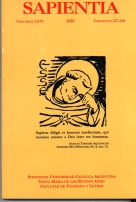Mircea Eliade y la sacralidad arcaica
Keywords:
Eliade, Mircea, 1907-1986, RELIGIONES ANTIGUAS, FILOSOFIA DE LA RELIGION, SACRALIZACIONAbstract
By describing the archaic forms of the sacred, Mircea Eliade opens the way to the study of religion in its very source: the ancestral “religious man” (homo religiosus). In fact, those are the structures that make up his particular point of view about himself, the other men and the cosmos, in the search of deliverance from all manners of evil and distress and of introduction in his real being as man. Assuming the perspective of the philosophy of religion i.e. the disclosure of the nature of religion, the present article intends to assume Eliade’s description of the structures making up the “archaic sacred” and discuss some of Eliade’s assessments, insisting, more specifically, in the fact that, although those structures seem to remain in all religions, they properly belong, in their ultimate manifestation, to the “cosmic” religions such as they appear particularly in “national religions” and some “universal religions”.
Downloads
Downloads
Published
How to Cite
Issue
Section
License
Copyright (c) 2010 Marcelo Labeque

This work is licensed under a Creative Commons Attribution-NonCommercial-ShareAlike 4.0 International License.





 Sapientia
Sapientia